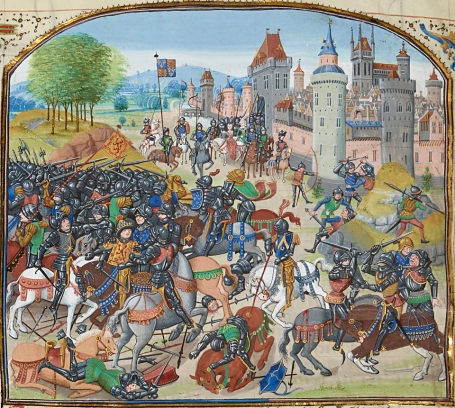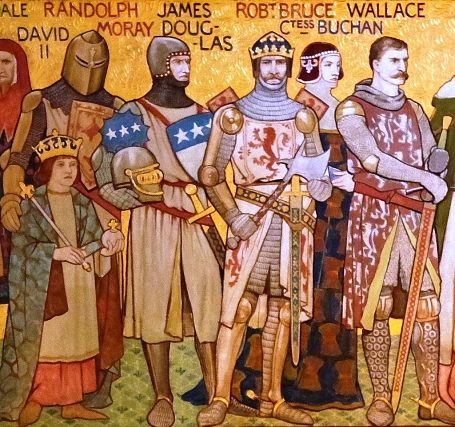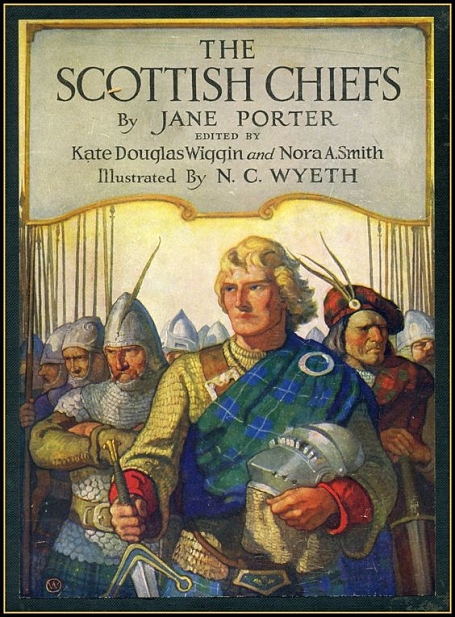The Life and Heroick Actions of the Renoun'd Sir William Wallace,
General and Governour of Scotland
by William Hamilton of Gilbertfield
Book XI, Chapter I (Continued)
The Battle of Falkirk
Tents and Pavilions were cast to the Ground,
Numbers of South'ron cut in Pieces down.
Edward he calls on Bruce to round him then,
With Twenty Thousand of well harnish'd Men
But the Surprise put them in such a Ghast,
That they were flying from all Quarters fast.
Wallace his Way thro' them did cut so clean,
As if he had more than a Mortal been.
Edward himself most bravely did behave,
Which to his Men both Life and Vigour gave.
Yet nothing could the Scottish Courage tame,
When they thought on the loss of Gallant Graham.
They fought like Furies in that dreadful Throng,
And 'mongst the South'ron rais'd a dolefull Song.
The English Commons fled on every Side,
But the best sort did with the King abide,
'Mongst whom was Bruce, who did behold the Dance,
And looked on with feigned Countenance.
Lord Hartford then did make him for the Flight,
Unto his King a mortifying Sight.
Who all this Time to flee a Foot disdains,
Untill the Scots 'most seiz'd his Bridle Reins.
His Banner-Man close by him Wallace slew,
Next to the Ground the Banner quickly flew.
At which the Scots were not a litle glad,
And then the King and all his Army fled.
Ten Thousand dead were in the Town and Field,
Before King Edward once his Ground would yield.
Yet Twenty Thousand fled of South'ron Men,
Tho' at the first, brave Wallace had but Ten,
The Scots in haste the Victory pursue,
All brave bold Men, stout like the Steel and true.
But Wallace wisely caus'd them close abide,
In a full Body and good Order ride,
Lest South'ron might at some convenient Place,
If they dispers'd, ralzy and turn the Chace.
In good Array thus rode they at his will,
And all they overtook did quickly kill.
They came so close upon the South'ron's Rear,
None from the Army durst come off for fear.
Ten Thousand Straglers joyn'd the South'ron Host,
Thus Thirty Thousand fled to England Post.
Tho' the Scots Horse were almost spent yet they
Caus'd Edward change his Horses oft that Day;
And then the Scots so closs upon them drew,
Three Thousand of the outmost Men they slew.
In Crawford Moor many a Man was slain,
Then Edward calls the Bruce to him again;
To charge the Scots with all his Power and Might,
For which he should be put in his own Right.
Then said the Bruce, "Sir, loose me of my Band,
And I shall turn, I give thee here my Hand."
When from the Bruce this Answer he did get,
He knew his Heart on Scotland then was set.
From that Time forth, Edward most subtilly,
Over the Bruce did cast a watchful Eye.
Bruce turned not, nor further Language made,
But with King Edward unto Solway rade.
Who when he came upon the English Coast,
Found that he Fifty Thousand Men had lost.
Wallace returns to Edinburgh without more,
Makes Crawford Captain as he was before.
The like he did unto his Judges all,
Each in his former Office did install.
Thus he to Scotland Peace and great Content
Procur'd, and then straight to St. Johnstoun went:
Where all the Scottish Lords assembl'd were,
To whom he all his Progress did declare.
By this Time Scrimgeor had reduc'd Dundee,
Then on a Gallows Mortoun hang'd was high.
Next was the Castle all in Rubbish laid,
And Scots no more of South'ron were afraid.
The noble Lords Wallace did then address,
And with good Air, himself did thus express.
"My Lords," said he, "since over all your Force
You made me Gen'ral, both of Foot and Horse,
I hope your Lordships plainly all do see,
Once more I've set this ancient Kingdom free.
And yet for all my Service, secretly
Some do reproach me: what a Pox care I!
With what's Ignoble, I dare boldly say,
There's none can charge me standing here this Day.
To stay at Home no longer I incline,
My Office therefore freely I resign.
No Gift I ask as my Reward or Fee,
I've Honour purchas'd, that's enough for me.
I'll back to France where I had Laud and Praise,
And spend the rest of my remaining Days."
The Lords did all oppose it, but in fine,
Was no Man there could make him change his Mind.
Most heartily he bad them all farewell,
Then march'd with Eighteen Men as stout as Steel.
The Baron's Sons of Brechin with him went,
And Longoveil, on Honour always bent.
Simon and Richard, Wallace Nephews brave,
Went both along for Honour or a Grave.
Sir Thomas Gray the Priest with him did fare,
Good Edward Little, Jop, and Mr. Blair.
And Kierly who, had long with Wallace been,
Thro' all the Wars, and bloody Bouts had seen.
With those brave Men he shipped at Dundee,
Then hoised Sail, and fairly set to Sea.
The ballad, The Life and Heroick Actions of the Renoun'd Sir William Wallace, General and Governour of Scotland, by William Hamilton of Gilbertfield, 1722, is in the public domain.

The Kingdom of England and the Kingdom of Scotland fought dozens of battles with each other. They fought typically over land, particularly Berwick-Upon-Tweed, and the Anglo-Scottish border frequently changed as a result. Read more at Wikipedia.

The First War of Scottish Independence was the initial chapter of engagements in a series of warring periods between English and Scottish forces lasting from the invasion by England in 1296 ... Read more at Wikipedia.

Digitized version of The Scottish Chiefs, by Jane Porter, a novelization published in 1921 by Charles Scribner's Sons, about William Wallace and the First Scottish War of Independence. Read online at archive.org.